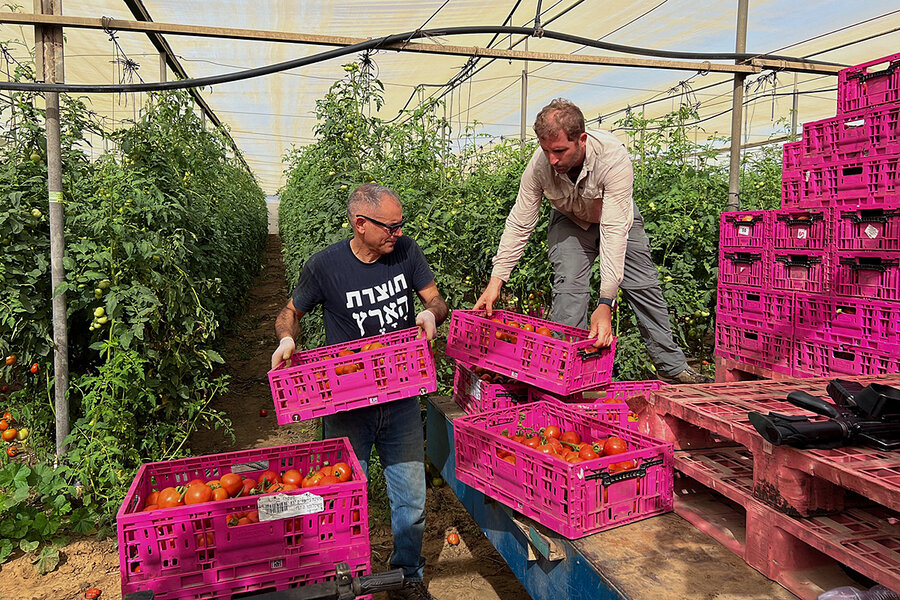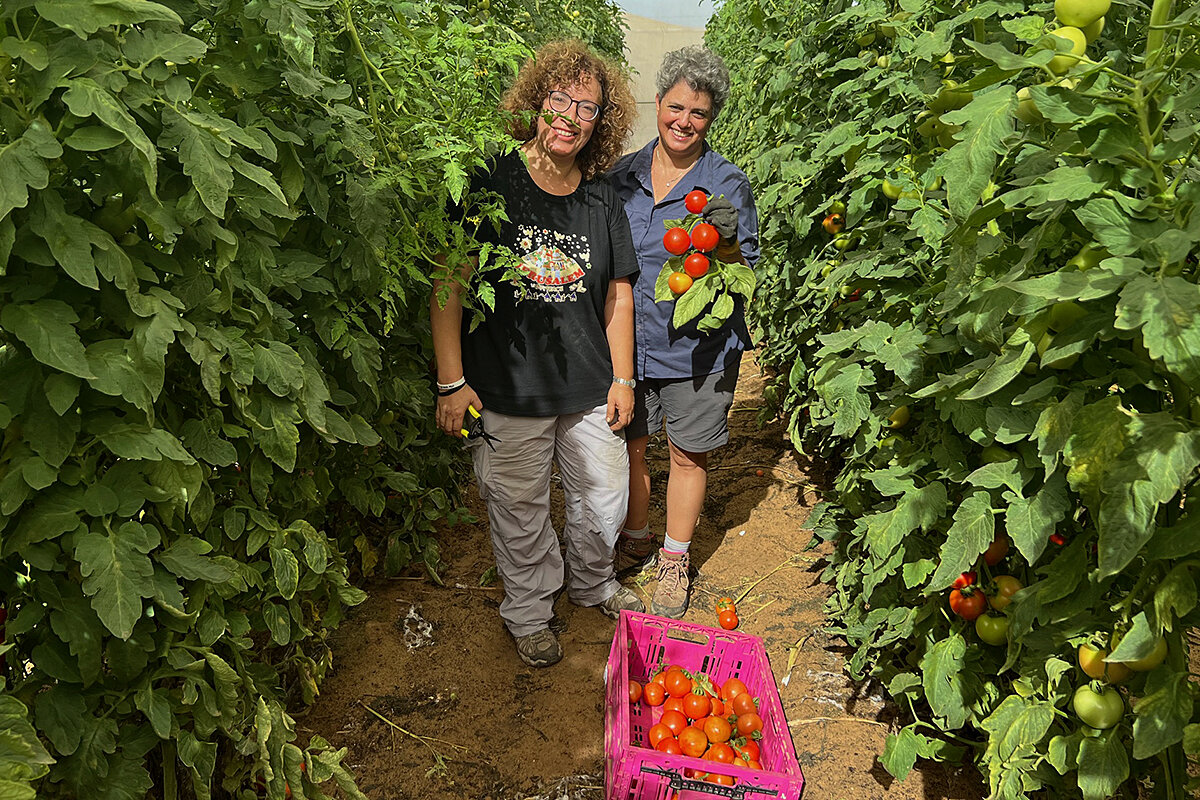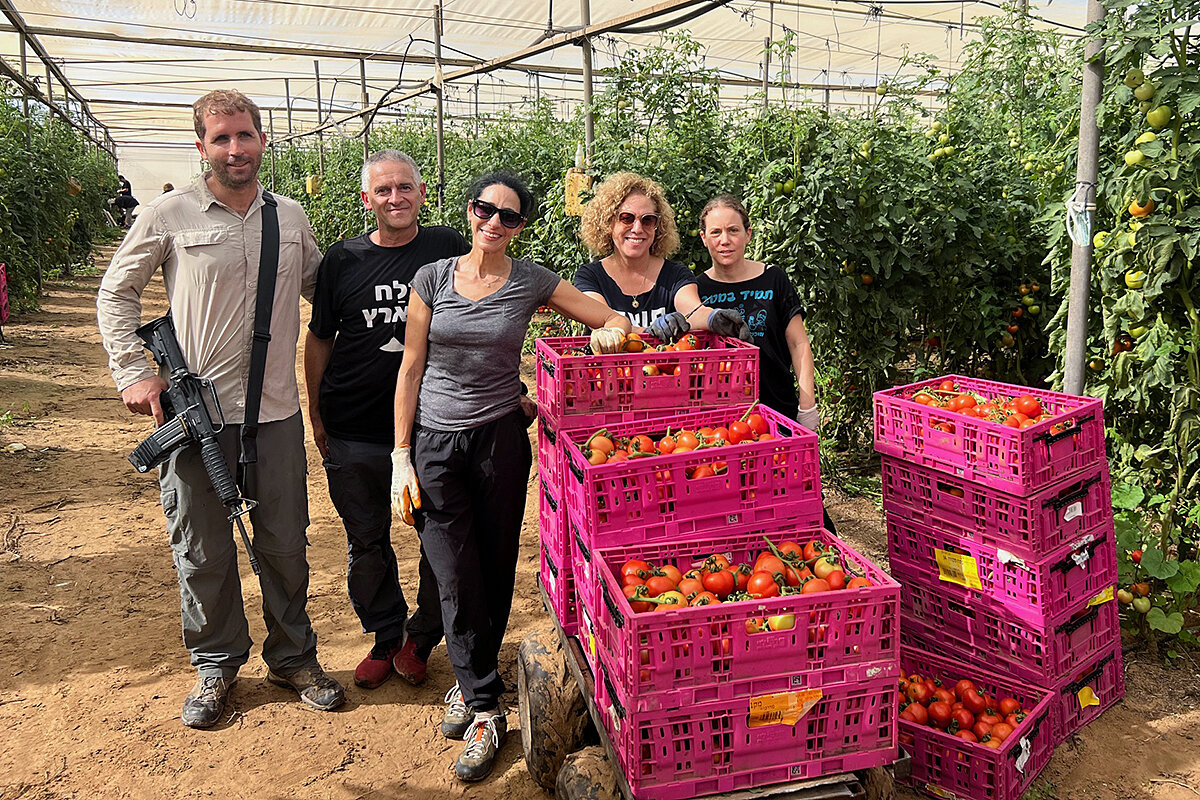On farm near Gaza, rescuing a crop today while thinking of tomorrow
Loading...
| MOSHAV YATED, Israel
The brutal Hamas attack on Israel on Oct. 7 sent thousands of migrant farmworkers, mostly from Thailand, fleeing back home. Farms near the Gaza Strip that normally grow 75% of Israel’s vegetables and nearly a quarter of its fruit were abandoned, their harvests threatening to rot.
But civil society groups have come to the rescue, organizing volunteers to harvest fruit and vegetables, milk cows, and plant winter crops.
Why We Wrote This
A story focused onCity-dwelling Israeli professionals have volunteered to take the place of foreign migrant farmworkers who fled the area near Gaza after the Hamas attack. As they pick tomatoes, how do they see their country’s future?
On a recent autumn morning, some three dozen such volunteers, mostly city dwellers and professionals, were picking tomatoes on a cooperative farm just 3 miles from the Israel-Gaza border, within earshot of the war.
They said they were doing it as a way of making themselves useful in a crisis, and of showing solidarity with farmers whose businesses were suffering. And as they worked, they talked – about the present, and the future.
A number of the volunteers were liberals, with hopes of a lasting peace with their Palestinian neighbors. Those hopes have taken a severe blow. But the temporary workforce is looking ahead nonetheless.
One volunteer had done a previous day of labor, planting broccoli for a winter harvest. “Picking tomatoes is about now, and that’s good,” he said. “But planting broccoli, that’s about the future.”
Inside the sand-colored, 3-acre greenhouse less than 3 miles from the Israel-Gaza border, within earshot of the war, an army of volunteers snips garlands of red-ripe tomatoes from towering vines, placing them in bright pink plastic crates.
As they peruse the crop for blemishes and fill their crates, the city dwellers-turned-farmworkers say the day’s labor gives them the sense that they are doing something to show solidarity with fellow Israelis in an area devastated by the brutal Hamas assault that killed 1,200 people on Oct. 7.
“I found myself at home on Fridays and worrying – worrying about my children, worrying about what’s happening with the war – so I decided, much better to do something useful,” says Osnat Ben Soussan, a Jerusalem tech industry worker wearing a big smile and shorts as she gets down to her third stint as a farmworker.
Why We Wrote This
A story focused onCity-dwelling Israeli professionals have volunteered to take the place of foreign migrant farmworkers who fled the area near Gaza after the Hamas attack. As they pick tomatoes, how do they see their country’s future?
With all three of her children and a son-in-law fighting in the war, she spent a lot of time following events.
Then public service spots started appearing on TV seeking volunteers for farmwork. “I thought, there it is; that’s something I can do,” she says.
The three dozen tech workers, teachers, engineers, and others picking tomatoes “are here to help me save my crops,” says Idan Alon, who works on the cooperative farm. “But maybe also they are here, after what happened, to help us keep agriculture going in this part of Israel.”
“I need to do this”
Within days of the Hamas rampage, a region that furnishes 75% of Israel’s domestically produced vegetables, 20% of its fresh fruit, and nearly 10% of its milk was deteriorating into a wasteland. Thousands of acres of crops ready for harvest risked rotting; dairy cows went without milking; chickens succumbed to heat and lack of water.
The thousands of migrant farmworkers who normally tended the fields, mostly from Thailand, had fled home. Some were killed or taken hostage by Hamas.
But then to the rescue of hundreds of southern Israel farmers like Mr. Alon came civil society groups such as HaShomer HaChadash (The New Guard), organizing members to harvest fruit and vegetables, milk cows, and plant winter crops.
It is HaShomer HaChadash’s job to strengthen Israelis’ ties to the land. But even groups with nothing to do with agriculture kicked in. The pro-democracy group Brothers in Arms, for example – known for organizing opposition to government plans for judicial reform – says that online requests for volunteers posted by its offshoot, Brothers in Farms, are oversubscribed within minutes.
Amir Malkin, a scoutmaster from Kadima, a town north of Tel Aviv about three hours’ drive from Moshav Yated, was quick to organize Scouts’ parents to make weekly trips to southern farms.
“Many of us here have been in the [military] reserves. With our Scouts, we organize service activities, so when [Oct. 7] happened, it just was natural to organize our parents to get involved,” says Mr. Malkin, a civil engineer. “I feel I need to do this.”
In the greenhouse, conversations quickly turn to service at a time of national crisis, and to concerns about the Israel that will emerge from the current war against Hamas.
High school chums Asi Adaki and Mati Fishbein rib each other just like the old days, disputing who is working faster and who is delivering the more marketable crate of tomatoes.
As he blares the Eurythmics’ “Sweet Dreams” and other ’80s classics over a speaker, Mr. Fishbein cuts his friend a momentary break and turns serious.
“I was an officer in the army for 25 years. I was the guy who delivered the message that your son had been killed in battle,” says Mr. Fishbein, now a real estate agent.
“That same sense of service you get in the military, you’re seeing it here. This is the power of the Israeli people,” he says. “In times of war we are trying to help each other – and then after the war,” he adds, “we can go back to fighting each other.”
Feeling alone, showing solidarity
His buddy Mr. Adaki pulls his head out of the vines and stops working long enough to disagree. “No, I think this time will be different,” says the El Al airline flight crew member. “For one thing, I really feel we don’t have any partners [in the region] anymore, so we Israelis will be on our own.”
That is a worry also for Elizabeth Blum, a math teacher of at-risk adolescents in Jerusalem. Social activism has always been a part of her life; her parents started their married life on a left-wing kibbutz. But she says the brutality of the Hamas attacks shook her to her core and left her thinking differently about the future.
“I was a peace activist,” belonging to the Women Wage Peace group, she says. “I really believed in it.” But then the atrocities of Oct. 7 occurred. Most searingly, a longtime friendship with an Arab woman dating back to university days collapsed into mutual recriminations and accusations about which side was more responsible for causing a terrible war.
“Now I really don’t believe peace is possible. I lost all trust in any person, any desire for peace on the other side,” she says, adding wistfully, “I’m done.”
Mr. Alon, the farmer, says his focus is on getting his tomatoes off the vine and to Israel’s markets within a day or two. But he, too, finds himself thinking about the future, and whether agriculture will ever again thrive near the Gaza Strip.
“People have to feel secure. They can’t do a good job with their farms or whatever work they do if they are worrying every day their family might come under attack,” he says.
Unless they feel safe, Israelis won’t come back to the kibbutzim and the farming towns around Yated, he says, and the foreign farmworkers – he had 20 on his farm – won’t return to Israel.
“And if that happens, if we do not stay here, the border will come more inside,” he says, gesturing westward toward Gaza. “We are already a small country,” he adds, “but what we see around us is that Israel could get smaller.”
As Oren Klimkel, one of the volunteers Mr. Malkin brought, stacks crates of tomatoes at the end of the day, he, too, speaks of the Israel that will come out of this war. And he is hopeful.
“It feels like we are doing good for the country now, but also that this experience will have some positive influence even after” the war, he says.
On his previous day of labor at the Alon farm, he planted broccoli for a winter harvest, Mr. Klimkel says. “Picking the tomatoes is about now, and that’s good. But planting the broccoli,” he adds, “that’s about the future.”











